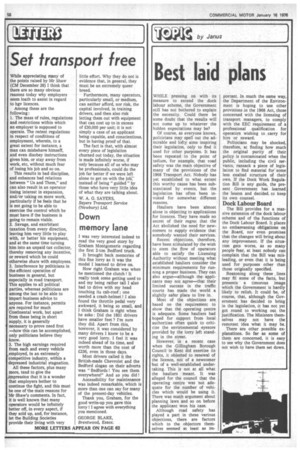Set transport free
Page 60

If you've noticed an error in this article please click here to report it so we can fix it.
While appreciating many of the points raised by Mr Shaw (CM December 26) I think that there are so many obvious reasons today why employers seem loath to assist in regard to hgv licences.
Among these are the following: 1. The mass of rules, regulations and restrictions within which an employer is supposed to operate. The recent regulations in respect of conditions of employment, wherein, to a great extent for instance, a man can misbehave himself, and even disobey instructions given him, or stay away from work, etc, without much fear of losing his job and so on.
This results in bad discipline, and enhances bad relations between "Us and Them," and can also result in an operator losing interest in expansion, and/or taking on more work, particularly if he feels that he is not going to be able to exercise the control Which he must have if the business is going to remain viable.
2. Savage, and exorbitant taxation from every direction, leaving him very little to play with, or better his equipment, and at the same time turning him into an unpaid tax collector, thereby removing any incentive, or reward which he could otherwise share with employees.
3. Interference by politicians in the efficient operation of business in general, but especially in road transport. This applies to all political parties, whereas politicians are among the last to be able to impart business advice to anyone. For instance, permits are required for much Continental work, but apart from these being in short supply, it is generally necessary to prove need first —how this can be accomplished, only politicians believe they know.
3. The high earnings required from each and every vehicle employed, in an extremely competitive industry, within a depressed industrial stagnation.
All these factors, plus many more, tend to give the .iimpression that it is a wonder that employers bother to continue the fight, and this must be one of the main reasons for MT Shaw'.s comments. In fact, it is well known that many operators would be infinitely better off, in every aspect, if they sold up, and, for instance, let the Building Societies provide their living with very
little effort. Why they do not is evidence that, in general, they must be an extremely queer breed.
Furthermore, many operators, particularly small, or medium, can neither afford, nor risk, the capital involved, in training drivers, and then also risk letting them out with equipment that can cost up to in excess of £30,000 per unit; it is not simply a case of an applicant being capable, and conscientious, but in having proof of that.
The fact is that, with almost every piece of legislation churned out today, the situation is made infinitely worse, if only because all of us who may be professionals, could do the job far better if we were left alone to get on with the job: instead of being " guided " by those who have very little idea of what they are talking about.
W. A. G. SAYERS, Sayers Transport Service (Newbury) Ltd.
memory lane
I was very interested indeed to read the very good story by Graham Montgomerie regarding the first 2-ton Bedford truck.
It brought back memories of this fine lorry as it was the model I learned to drive on.
How right Graham was when he mentioned the clutch ! It really took some getting used to and my being rather tall I also had to drive with my head touching its cab-roof ; one needed a crash-helmet ! I also found the throttle pedal very awkward, it being so small, and I think Graham is right when he asks : Did the 1931 drivers have smaller feet ? I'm sure they did. Apart from this, however, it was considered by many drivers I knew to be a very good lorry. I feel it was indeed ahead of its time, and worth more than the cost of £236, even in those days.
Most drivers called it the British-made Chevrolet and the Bedford slogan on their adverts was " Bedfords ! You see them everywhere!" And so you did !
Accessibility for maintenance was indeed remarkable, which is more than one can say for many of the present-day, vehicles.
Thank you, Graham, for the good write-up you gave this lorry ! I agree with everything you mentioned.
GEORGE BLAKE, Brentwood, Essex.












































































































